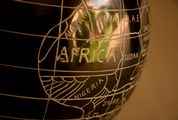ONCE a year, people from all over the world travel to a small village in Swaziland for a weekend of music and art.
Now in its 10th year, the MTN Bushfire Festival was once described by American news channel CNN as one of seven African must-see festivals. Also, founding director Jiggs Thorne has used the festival as a force for good, raising money for charities and employing it as a platform from which to find creative solutions to local problems.
"It’s a wild fire," says founding director Jiggs Thorne. "It’s superceded any initial vision we had."
This year the line-up includes acts from 15 countries. Among the performers are South African Afro-pop group Mafikizolo, South African newcomers Bombshelter Beast (featuring South African Kwaito/Hip Hop MC Pitch Black Afro) and Cape-Town-based African-psychedelic-pop band Native Young. The festival’s main stage will be taken by New Zealand’s Estère, whose work is described as "electric blue witch hop".
"It’s quite an epic weekend," said Tankiso Makhene, who was at the festival last year. "It’s a nice, full-on experience where you just want to let go and not have a care."
Mr Thorne, Swazi-born and bred, says MTN Bushfire was a natural extension out of an existing programme at his family’s House on Fire art and events venue. "We had a captive market (because of the existing events programme). The first year we had about 4,500 people (attending). Ten years later, close to 30,000 come down to Swaziland. It has grown dramatically."
The venue grounds comprise an art gallery, an amphitheatre and a large outdoor stage.
"There’s a kids section, and they usually have karaoke," says Mr Makhene. It’s nice to watch them, and there’s crafting — you can go and do that if you want to. Sunday’s chilled, it’s a bit different from the Saturday (when the big headliners perform)."
Mr Thorne has always used the festival to help to develop Swaziland’s arts scene, and to highlight local issues and try to identify solutions through "creating a space for dialogue" in various workshops. This year topics include the drought that has crippled southern Africa, water conservation, the commercialisation of marijuana in Swaziland and hydroponics, a method of growing plants using mineral nutrient solutions, in water, without soil.
There is also a section where local crafters and entrepreneurs exhibit their wares, an aspect Mr Makhene said he especially enjoyed.
In the week preceding the festival — this year it takes place over the weekend of May 27-29 — a schools’ festival is run, at which local and international artists perform for Swazi school children. Ongoing discussions centre on incorporating the arts into the Swazi school curriculum.
There is also an exchange programme with other regional arts festivals, and a market run during the festival weekend promotes local producers and artisans. The festival has raised more than R1m for various charities.
For more information visit www.bush-fire.com
-

Picture: MTN BUSHFIRE FESTIVAL
-

Picture: MTN BUSHFIRE FESTIVAL
-

Picture: MTN BUSHFIRE FESTIVAL
ONCE a year, people from all over the world travel to a small village in Swaziland for a weekend of music and art.
Now in its 10th year, the MTN Bushfire Festival was once described by American news channel CNN as one of seven African must-see festivals. Also, founding director Jiggs Thorne has used the festival as a force for good, raising money for charities and employing it as a platform from which to find creative solutions to local problems.
"It’s a wild fire," says founding director Jiggs Thorne. "It’s superceded any initial vision we had."
This year the line-up includes acts from 15 countries. Among the performers are South African Afro-pop group Mafikizolo, South African newcomers Bombshelter Beast (featuring South African Kwaito/Hip Hop MC Pitch Black Afro) and Cape-Town-based African-psychedelic-pop band Native Young. The festival’s main stage will be taken by New Zealand’s Estère, whose work is described as "electric blue witch hop".
"It’s quite an epic weekend," said Tankiso Makhene, who was at the festival last year. "It’s a nice, full-on experience where you just want to let go and not have a care."
Mr Thorne, Swazi-born and bred, says MTN Bushfire was a natural extension out of an existing programme at his family’s House on Fire art and events venue. "We had a captive market (because of the existing events programme). The first year we had about 4,500 people (attending). Ten years later, close to 30,000 come down to Swaziland. It has grown dramatically."
The venue grounds comprise an art gallery, an amphitheatre and a large outdoor stage.
"There’s a kids section, and they usually have karaoke," says Mr Makhene. It’s nice to watch them, and there’s crafting — you can go and do that if you want to. Sunday’s chilled, it’s a bit different from the Saturday (when the big headliners perform)."
Mr Thorne has always used the festival to help to develop Swaziland’s arts scene, and to highlight local issues and try to identify solutions through "creating a space for dialogue" in various workshops. This year topics include the drought that has crippled southern Africa, water conservation, the commercialisation of marijuana in Swaziland and hydroponics, a method of growing plants using mineral nutrient solutions, in water, without soil.
There is also a section where local crafters and entrepreneurs exhibit their wares, an aspect Mr Makhene said he especially enjoyed.
In the week preceding the festival — this year it takes place over the weekend of May 27-29 — a schools’ festival is run, at which local and international artists perform for Swazi school children. Ongoing discussions centre on incorporating the arts into the Swazi school curriculum.
There is also an exchange programme with other regional arts festivals, and a market run during the festival weekend promotes local producers and artisans. The festival has raised more than R1m for various charities.
For more information visit www.bush-fire.com


























Change: 0.83%
Change: 0.93%
Change: 0.95%
Change: 0.73%
Change: 1.91%
Data supplied by Profile Data
Change: 0.58%
Change: 0.15%
Change: 0.83%
Change: 0.00%
Change: -0.04%
Data supplied by Profile Data
Change: -1.10%
Change: 0.14%
Change: 0.10%
Change: -0.21%
Change: -0.35%
Data supplied by Profile Data
Change: 0.85%
Change: 0.84%
Change: 0.59%
Change: 1.76%
Change: 2.44%
Data supplied by Profile Data